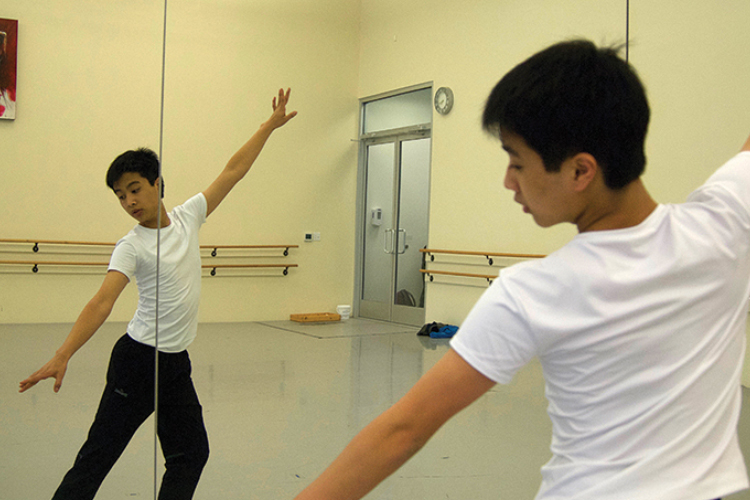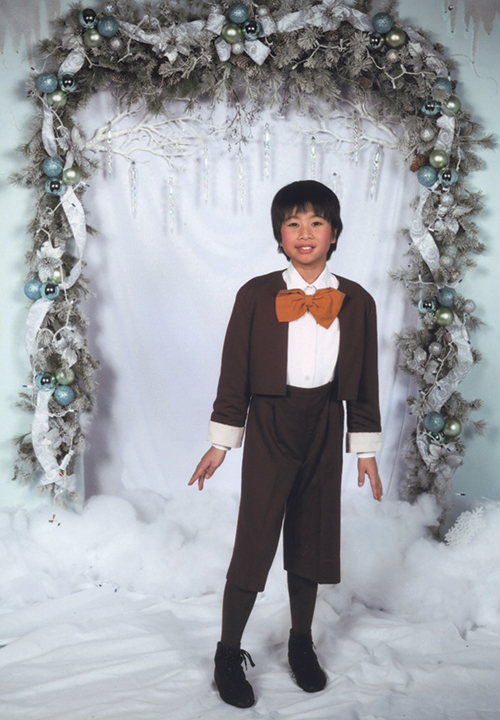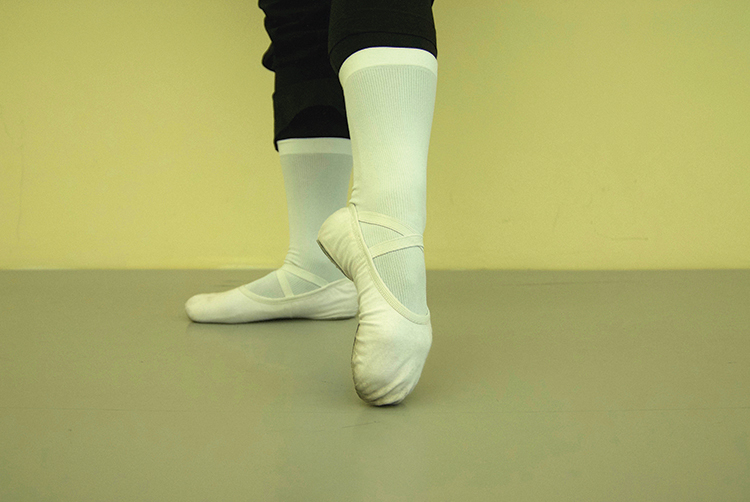
The dressing room backstage at the Keller Auditorium in downtown Portland is packed. Seats that were once occupied by dancers are now vacant as the dancers apply makeup and fix costumes in front of mirrors. The time for Oregon Ballet Theatre’s (OBT) annual “Swan Lake” performance is quickly drawing near, and the young dancers are busy making sure everything is perfect.
Nerves are running high, but Wesley Johnson, 15, feels right at home.
Dressed in tights and a white peasant shirt, Johnson and the rest of his ensemble skip across the stage, wide smiles on their faces. As part of the scene, they chat and giggle in anticipation, as if waiting for something big to happen.
Then the male lead, an adult dancer with the OBT company, leaps onto the stage, and Johnson whirls around him to fast-paced music with the other young dancers.
Johnson, a freshman at Grant, has been doing ballet since he was 8 years old. Though this is his first time performing in “Swan Lake,” the dance environment is a familiar one. He’s used to the hustle and bustle of the dancers, the costumes and the feel of everything slipping away once he steps on stage.
“That’s the whole reason I look forward to the day, going to dance,” he says.
Ballet may not be the conventional extracurricular passion for most high school boys, but for Johnson, the school of OBT, where he takes lessons four times a week, provides a second home and a sense of belonging.
The world of pre-professional dance can be cutthroat, but it’s never been about competition for Johnson. It’s simply what he loves to do.
“When I perform on stage, I feel like I don’t have to worry about competition or about time,” Johnson says. “All I have to think about is my gracefullness.”
Johnson, who goes by ‘Wes,’ was born in Vietnam on November 23, 2001 and adopted at 10 months old by Steve Johnson and Susan Omura. They both love to travel and knew they wanted to adopt internationally since they were married.
Having adopted Johnson’s older sister, June, from Korea in 2000, his parents had some previous experience with adoption. “It’s sort of fun getting to see this little child who you just have no idea what their genetic potential is,” Omura says. “It’s a whole package: there’s already so much there, even in a little infant.”
Adoption can be hard for kids to navigate, but it hasn’t been difficult for Johnson. “I know that it was the right thing to do, and that it had to be done for me to be happy and successful,” he says now.
As a kid, Johnson’s interests bounced around a lot. “When he was little, he would have obsessions almost, things that he was interested in that he would see everywhere,” Omura says, recalling Johnson’s short-lived fixation with flags and his passion for art.

When Johnson found ballet, he wasn’t the first in his family to take an interest in the art form. His aunt, June Wheeler, started doing ballet at age 7 and continued dancing throughout high school. She later joined the Mark Morris Dance Group, a professional modern dance company based in New York.
She helped Johnson gain an exposure to dance at an early age. When Wheeler took care of him as an infant, she would put music on and dance with him. “I remember … holding him in my arms and … waltzing around the room, and he loved that,” she says.
Since he was young, Omura also took her son to Wheeler’s shows constantly. Johnson remembers watching “The Hard Nut,” a version of “The Nutcracker” put on by the Mark Morris Dance Group. Even at a young age, Johnson felt instant inspiration. “That’s what triggered me to want to do dance, watching it. I was like, ‘I’m gonna be in ‘The Hard Nut’ when I grow up,’” he says.
Johnson attended Laurelhurst K-8 for both elementary school and middle school. Like many kids, he tried a variety of sports in early elementary school. But for him, nothing clicked. He didn’t enjoy tee ball, and soccer didn’t interest him as much as it did his sister. His mom worried he wouldn’t be able to get sufficient physical activity.
That changed when Omura signed her son up for dance classes at OBT when he was 8 years old.
At the same time, Omura was taking adult lessons at OBT herself, picking up an old childhood hobby. By the time she tried to sign her son up, she had missed the deadline. When the director at OBT found out she had a son, the deadline was excused.
“There was no question of any deadlines because they need boys in ballet. There are so many girls that take it and not many boys,” she says. “They were thrilled to have him.”
This gender difference is a well-known issue within the dance community.
Christopher Kaiser, a professional dancer at OBT, has experienced this throughout his ballet career. “I was one of three boys in the dance studio where there was like a hundred girls,” Kaiser says about his dance classes as a kid. “Males are just not as exposed to it as women are. When I speak to guys actually, a lot of people say, ‘I’ve never met a male dancer, I didn’t really think about that.’”
For Johnson, this was more of a gradual realization. “I’ve kind of always known that ballet is not really a ‘boy’s thing.’ But it’s fun,” he says. “I’ve gotten used to it.”
Kasandra Gruener, the director of education outreach at OBT, recognizes the impact early exposure to dance can have on young boys like Johnson. “I think that the earliest exposure creates an open mind to the idea. It doesn’t mean that they’re all going to become dancers or that they all even like to do it. But that they’re more open to it,” she says.
Initially, starting out young wasn’t easy for Johnson.
Because he joined the class late, he had difficulty adapting. “I remember my first class. It was really awkward because I felt like I didn’t know what I was supposed to do,” he recalls. “I just sat in a corner, and everyone else knew each other because they had been there before. So I was just like awkwardly looking around and … being really quiet and timid.”
As a result, Johnson wasn’t sure he wanted to continue dancing.
But by only his third class, this had changed. “I made so many new friends,” Johnson recalls. “You get to know everyone in that class really well, and then you become friends with everyone … It makes you feel more comfortable there.”
Despite things going well for Johnson in the dance world, life at home was a little more difficult – Johnson’s parents divorced when he was in fifth grade. But because he was young, he says it didn’t affect him very much.
Though he spent more of his time living with his mom, both parents noticed how Johnson would subconsciously practice his ballet steps at home. “I don’t even know if he’s aware of it, but he’ll do something with his legs … put himself in a position or take a couple of steps, and I know he’s just rehearsing something he did in class,” Steve Johnson says about his son.
From the beginning, the dance studio provided an escape for him. If Johnson had a stressful day at school, it was where he went to relax.
“It’s just nice to go somewhere where you don’t have to think at all about school,” Johnson says. “And my dance studio is nowhere near Grant, so I’m like, ‘No need to think about school right now, just focus on what’s going on.’”
Doing ballet also made Johnson feel unique.
“It’s just been really nice because not a lot of other (boys) do dance,” Johnson says. “They may be better at basketball than I am, but I’m better at doing this.”
Because there is a lack of boys in ballet, the majority of the male students will be chosen for performances, whereas it’s harder for girls to be chosen because there are significantly more of them.
As a result, Johnson was performing frequently from the very start. Though roles started out small — like playing a rooster in a dance titled “Carnival of the Animals” — they quickly became larger and more complex as Johnson’s skills improved.
Johnson performed in OBT’s annual “Nutcracker” show in December of 2012 and 2013, before taking part in “Coppelia” in April 2016, where his role was a village child.
As performances became more frequent for Johnson, he began making an impression on other people at the ballet school. Sophie Feldman, also 15, met Johnson at the school a few years after he joined.
The two became instant friends. Johnson and his passion for ballet stood out to Feldman more than other students. “There’s just been many times, where, before class started, we were laughing really hard about something, and then we got in the studio, and it got more ballet and less the funny thing we were laughing about before,” Feldman says.

Johnson didn’t only catch the eyes of his fellow students at OBT though. Elise Leger, one of his teachers, says, “He works conscientiously, cleanly, and really takes corrections and works on them. And teachers love those kind of students.”
Johnson began to spend more time at the studio, sometimes going to class an hour early just to hang out. The community he found at the school made him feel more comfortable than anything else.
“A lot of my friends have been teased at school before … At dance, I’ve never seen that happen,” Johnson says. “My friends at dance seem more understanding and willing to listen.”
As he’s gotten older, Johnson began to notice competitive attitudes among his peers at OBT, something that isn’t uncommon within the dance world.
He remembers hearing his friends complain about the same people being picked for the leads in “The Nutcracker” every year, despite their own hard work. “There are a few people at ballet who get really competitive,” Johnson says. “It makes it harder for them to dance, trying to be better at dance.”
For Johnson, competition is something to be avoided alltogether. “Those people that are really competitive don’t usually do as good in class, and they get really stressed,” he says. “You can tell that they aren’t very happy.”
“I’ve never really had competitive feelings,” Johnson says. “(Dance) is something you should do for fun instead of making it into a big competition.”
In the fall of 2016, Johnson started high school at Grant. But high school proved more demanding than he expected, and Johnson was compelled to cut “The Nutcracker” from his repertoire. “I stopped (performing in ‘The Nutcracker’) because it takes up too much time,” Johnson says. “Now that I’m in high school, I didn’t want to risk that.”
Despite this, Johnson has continued to branch out in dance and participate in other, less time-consuming performances.
This February, Johnson performed in OBT’s annual “Swan Lake” for the first time, as a villager. “You have to be the stronger of the students, and it’s definitely an honor to be chosen,” Leger says about “Swan Lake.” “There’s no room for mistakes.”
Though Johnson was nervous for “Swan Lake” at first, the familiarity of dance came back quickly. “The very first show, you’re really stressed because you’re like, ‘Oh my god there’s an audience, and if I mess up, what will I do? What will everyone think?’ But then after the first show they just fall into place,” he says.
On a recent Monday, Johnson sits on the carpeted floor next to a dance studio at the Oregon Ballet Theatre school in Southwest Portland, surrounded by friends. Though his class doesn’t start until 5 p.m., he’s been here since 3:30 p.m. He doesn’t mind; this school is a second home to him.
When the clock on the wall reads 5 p.m., Johnson and his friends dash into the studio and slide smoothly into place by the barre. The music begins, and the dancers assume the first position in their plié combination like clockwork. There is a trace of a smile visible on Johnson’s face as he begins to dance.
Johnson is not sure what role ballet will play in his future yet. “I want to stay doing dance at least until my senior year of high school, but I don’t know if I want to continue it into my adulthood,” he says. “It’s a little too far for me to plan.”
But for now, Johnson is happy right where he is and remains adamant about what dance means to him.
“Be yourself. Dance,” says Johnson. “Be who you are and dance the way you do.” ◆




